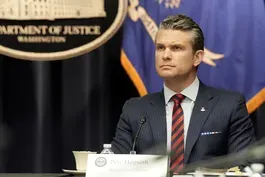
'Love, Queenie' chronicles life of actress Merle Oberon
Clip: 4/22/2025 | 6m 53sVideo has Closed Captions
New book 'Love, Queenie' chronicles life of trailblazing South Asian actress Merle Oberon
As the first Asian, and only South Asian, to be nominated for a Best Actress Oscar, Merle Oberon’s place in the pantheon of cinema is historic. But it came with enormous sacrifice as Oberon had to hide her race to stay working. Amna Nawaz sat down with writer Mayukh Sen to discuss "Love, Queenie," a new book on Oberon’s rise to fame, her groundbreaking career and eventual fade from the spotlight.
Problems with Closed Captions? Closed Captioning Feedback
Problems with Closed Captions? Closed Captioning Feedback
Major corporate funding for the PBS News Hour is provided by BDO, BNSF, Consumer Cellular, American Cruise Lines, and Raymond James. Funding for the PBS NewsHour Weekend is provided by...

'Love, Queenie' chronicles life of actress Merle Oberon
Clip: 4/22/2025 | 6m 53sVideo has Closed Captions
As the first Asian, and only South Asian, to be nominated for a Best Actress Oscar, Merle Oberon’s place in the pantheon of cinema is historic. But it came with enormous sacrifice as Oberon had to hide her race to stay working. Amna Nawaz sat down with writer Mayukh Sen to discuss "Love, Queenie," a new book on Oberon’s rise to fame, her groundbreaking career and eventual fade from the spotlight.
Problems with Closed Captions? Closed Captioning Feedback
How to Watch PBS News Hour
PBS News Hour is available to stream on pbs.org and the free PBS App, available on iPhone, Apple TV, Android TV, Android smartphones, Amazon Fire TV, Amazon Fire Tablet, Roku, Samsung Smart TV, and Vizio.
Providing Support for PBS.org
Learn Moreabout PBS online sponsorshipAMNA NAWAZ: As the first Asian and only# South Asian actress to be nominated for## a best actress Oscar, Merle Oberon's place in# the pantheon of cinema is historic, but it came## with enormous sacrifice.
For decades, Oberon# had to hide her race to stay working in film.
I recently spoke with writer Mayukh# Sen whose new book, "Love, Queenie:## Merle Oberon, Hollywood's First South Asian# Star," chronicles Oberon's rise to fame,## her groundbreaking career, and# eventual fade from the spotlight.
It's part of our arts and culture series, Canvas.
Mayukh, welcome to the "News# Hour."
Thanks for being here.
MAYUKH SEN, Author, "Love, Queenie: Merle Ober... First South Asian Star": Thank you for having me, Amna.
AMNA NAWAZ: So before we dive into the details# of Mer.. came to be.
I mean, what was it about her# and her story that made you want to dig in?
MAYUKH SEN: So I have always been fascinated by# Merle Oberon ever since I first encountered her,## which was all the way back in the summer of 2009.
I was a rising senior in high school and# I was obsessed with the Oscars.
And I## learned that she had been the first# Asian actress who was nominated for## an Academy Award for acting all the way# back in 1936.
And then I learned that she## had grown up in the city of Kolkata,# which is where my father was from.
And so, ever since then, I have really wanted to## tell her story.
And there hasn't been a# proper biography of her in over 40 years.
AMNA NAWAZ: Yes.
MAYUKH SEN: So I told myself, you## know what, I think it's time for me to just take# this project o.. AMNA NAWAZ: And the story that most people# knew about her as she was making her way## through Hollywood was that she was a British# actress, that she was born in Tasmania,## that she was raised in India, then brought# to England.
That's the story she told people.
What was the truth about her life?
MAYUKH SEN: So something that emerged in the years# after her death in.. despite posturing before the public# eye as this white Tasmanian-born woman,## was in fact born into poverty in the# city that was then known as Bombay,## now Mumbai, India, to a South# Asian mother and a white father.
And she spent the first 18 years of her# life in India living through poverty.## And it was only after she went to England in# 1929 that this fictitious backstory was created## for her by studios that she was actually# a white woman born in Tasmania.
And that## is a lie that would stick with her throughout# the entirety of her life, at least publicly.
AMNA NAWAZ: What did it mean to grow up# mixed-race in India in the early 1900s?
MAYUKH SEN: Yes.
So Merle Oberon, she was born as Queenie#Thomson in India, right?
And many Anglo-Indians,## Merle Oberon included, grew up having to deal# with intense social discrimination because the## fact that they were essentially neither here nor# there.
They didn't easily assimilate into the## wider South Asian population and they were also# almost always rejected by white British folks.
AMNA NAWAZ: And the context for# when she comes to the United States,## as you point out in the book, is, again, one of# real overt racism towards South Asians, right?
There was an immigration act that barred# South Asians from entry.
Hollywood had a## code in place that barred any# interracial romance on screen.## You write in the book that her identity# was a secret she guarded with her life.
What would have happened if people had found out?
MAYUKH SEN: So her career would have# been completely destroyed had people## known that she was in fact a mixed-race# girl who was born into poverty in India.
The Hays Code, which was instituted in# 1934, which is coincidentally the same## year that Merle Oberon first arrives in# America, for example, one of its edicts## barred the depiction of interracial romance,# which was defined in the text as being between## black and white races, but produced such# a chilling effect that it also affected## the opportunities for non-Black people# of color, including Merle Oberon.
So had people known that she was# actually mixed race and South Asian,## she would not have been able# to play any leading roles.
AMNA NAWAZ: And she does land some roles, right?# She stars opposite of Laurence Olivier as Cathy## in "Wuthering Heights," as Anne Boleyn# in "The Private Life of Henry VIII."
How does she hide her identity?# What does she have to do?
MAYUKH SEN: I mean, it requires enormous# sacrifice.
First, she's armed with this## backstory that was created for her all the way# back in 1932 by a company called London Films.## They're the ones that, you know what, we're going# to give you this fictitious backstory that will## essentially deflect any sort of curiosity# or speculation about your heritage, right?
And alongside that, she has to endure# so many terrible and torturous, frankly,## beauty regimens.
When she was making the# 1935 film "The Dark Angel," which is the## film for which she received her historic# best actress nomination, she had to undergo## an entire day of skin bleaching because studio# crew essentially thought that she was too dark.
And this is something that she had to go through# routinely as she was making films in Hollywood.
AMNA NAWAZ: What kind of# impact did that take on her,## not just on her career, but her# personally, psychologically?
MAYUKH SEN: I mean, I think that it really# incurred such a deep psychological cost on her.
And what I found as I was writing my# book and really spending a lot of time## with the archives and her personal# papers is that she was essentially## in this dance between having to# deny who she was in public while## in private still keeping in touch# with her family members from India.
And that sort of tension, I think, really# reached a boiling point later in her life.
AMNA NAWAZ: You write also in the book that the## words forgotten and overlooked get thrown# around rather indiscriminately these days.. but they apply to Merle.
Why do you say# that?
What do you think her legacy is today?
MAYUKH SEN: When it comes to conversations# about Asian identity in America,## so often I find people fixate on East# Asian or Southeast Asian identity,## not necessarily South Asian identity,# which is what Merle's story represents.
Alongside that, I would say the fact# that she's mixed race has sometimes## disqualified her from these conversations# about representation.
And then, of course,## you add to the fact that she passed as# white and she had to deny her heritage.
But I do find that, in terms of Merle's legacy,# what she was really fighting for, whether she## was conscious of it or not, was an entertainment# ecosystem in which people, especially performers## of color, did not have the roles that were# available to them dictated purely by their race.
This was a South Asian woman# who grew up in poverty,## who went on to play Cathy in "Wuthering# Heights," this canonically white role.
MERLE OBERON, Actress: Heathcliff,# make the world stop right here.
MAYUKH SEN: She was a leading lady and# a box office draw and a total star in## the '30s and '40s.
And I do think that# there's so many South Asian performers## working today who are indebted to# her, whether they realize it or not.
AMNA NAWAZ: The book is "Love,# Queenie."
The author is Mayukh Sen.
Thank you so much for being here.
It's# such a pleasure to speak with you.
MAYUKH SEN: Thank you, Amna.
Economic forecasts show global impact of Trump tariffs
Video has Closed Captions
Economic forecasts show Trump's tariffs having major global impact (7m 51s)
Foreign policy experts on Trump's student activist crackdown
Video has Closed Captions
Foreign policy experts offer views on Trump administration's student activist crackdown (8m 45s)
News Wrap: Hegseth threatens criminal prosecution over leaks
Video has Closed Captions
News Wrap: Hegseth threatens criminal prosecution over leaks (7m 30s)
Student loan collections to resume for borrowers in default
Video has Closed Captions
Student loan debt collections to resume for borrowers in default (6m 29s)
Supreme Court hears school curriculum, parental rights case
Video has Closed Captions
Supreme Court hears major case on public school curriculum and parental rights (7m 17s)
Vatican plans for Francis' funeral amid conclave speculation
Video has Closed Captions
Vatican plans for Pope Francis' funeral as conclave speculation intensifies (6m 33s)
Providing Support for PBS.org
Learn Moreabout PBS online sponsorshipSupport for PBS provided by:
Major corporate funding for the PBS News Hour is provided by BDO, BNSF, Consumer Cellular, American Cruise Lines, and Raymond James. Funding for the PBS NewsHour Weekend is provided by...

















